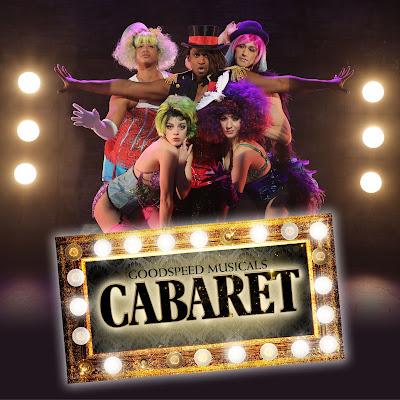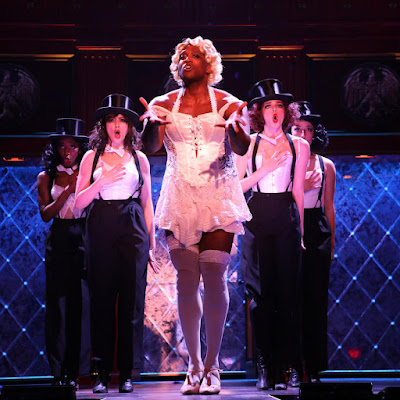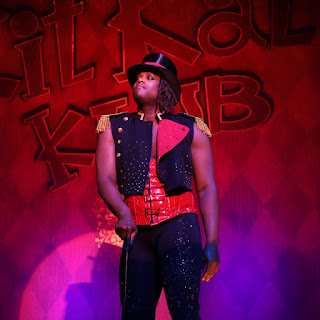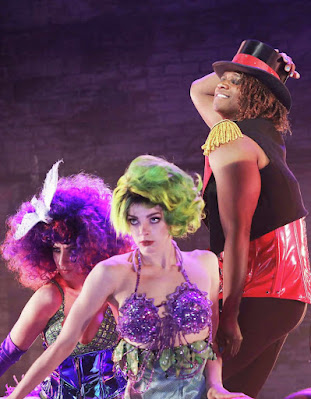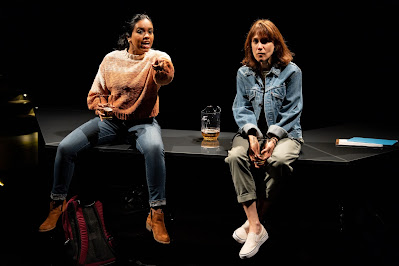By James V. Ruocco
Let the drum roll, begin.
Welcome to inviting, atmospheric world of the Weimar Republic's Kit Kat Klub, as envisioned by director James Vasquez and choreographer Lainie Sakakura for the Goodspeed's colorful, hugely entertaining revival of the oft-produced Kander and Ebb musical "Cabaret.
"Here, the girls are beautiful. The boys are beautiful. Even the orchestra is beautiful."
By all means, YES.
But, in moderation.
No room for delivered menace, masterbation, creepiness or sexual overload here.
Thjs "Cabaret" is Disney Plus with PG-suggestiveness and brightly gift-wrapped charm and gusto.
And that's perfectly OK.
But first, let's backtrack.
Since its Broadway debut in November, 1966, the original "Cabaret" stage musical has been changed, altered, rewritten and revised to include original songs from the 1972 film adaptation directed by Bob Fosse or new ones that were introduced in subsequent incarnations including the 1993 London revival by Sam Mendes, his 1998 Broadway production with Natasha Richardson as Sally Bowles and Alan Cumming as the Emcee and the current West End London revival that originally starred Eddie Redmayne and Jessie Buckley and now features Fra Fee and Amy Lennox in the signature roles of the Kit Kat Klub Emcee and cabaret singer, the notorious Sally Bowles.
This edition - played out in glorious Technicolor on the Goodspeed Musicals stage with sumptuous lighting cues by designer Amanda Zieve - takes its cue from both the original 1966 Broadway musical and the critically-acclaimed Sam Mendes revival and deletes "Meeskite," "The Telephone Song" and "Why Should I Wake Up?" from the song list, but adds "Maybe This Time" "Mein Herr" "Heiraten" from the 1972 film version of "Cabaret" along with "I Don't Care Much" from the 1987 production that brought Joel Grey back to Broadway to reprise his original Tony award-winning role.
Not to worry, though.
This "Cabaret," despite lots and lots of revisions to Joe Masteroff's original book, wisely retains most of the music from the original 1966 Broadway Kander and Ebb production that starred Jill Haworth, Lotte Lenya, Joel Grey, Bert Convy and Jack Gilford. Then and now, the iconic, popular "Cabaret" songs - "Willkommen!" "So What?" "Don't Tell Mama," "Perfectly Marvelous," "Two Ladies," "It Couldn't Please Me More (A Pineapple)," "Tomorrow Belongs to Me," "The Money Song," "Married," "If You Could See Her," "What Would You Do?" "Cabaret" and the "Willkommen! (Reprise)" - are included in this retelling of the familiar musical story.
Overseeing the pungent and tangy musical score for "Cabaret" is Goodspeed's resident musical director Adam Souza whose credits include the Broadway productions of "Wicked" and "Kinky Boots," "Next to Normal" for Hartford's TheaterWorks and more than 15 musicals for Goodspeed including "Rags," "A Grand Night for Singing," "Because of Winn Dixie," "Very Good Eddie," "George M" and "Brigadoon." A master of color, expression, slam, bam and motion, Souza's comfortable, fluid take on the Kander and Ebb score is laden with perfectly realized choices that give way to the score's gravity, surprise, cutting wit, silence and space. Songs flow with demand and powerful assurance. Moods, scuttles, summons, warnings and shots erupt with maximum effect and thrust. Harmonies blend together with effortless precision and melodious dynamic. Solos and big, production numbers have style, purpose and importance.
Doubling as conductor and keyboardist I, Souza's hand-picked orchestral team features Adam J. Rineer (reed); Liz Baker Smith (reed I): Andrew Studenski (reed II), Pete Row (trumpet), Matthew F. Russo (trombone) and David Uhl (bass). Their orchestral energy - confidant, vibrant and varied - adds fuel, bite, sting and allure to the proceedings, offset by an obvious respect and appreciation for the musical's originators that makes every single one of the show's familiar character-driven songs not only stand out, but move the story forward seamlessly without any hiccups, hesitations or halts. It's all superbly detailed, gleaming, original and special.
From the rousing, inviting opening number "Willkommen!" to the surprise, mind-blowing "Finale" that ends Act II, this "Cabaret" unfolds with a saucy, sweet and determined spin that takes the already familiar music to an entirely new level. Yes, we know the music. Yes, we know the lyrics. Yes, we know the song rota. Yes, we know who sings what - "Don't Tell Mama," "Perfectly Marvelous," "Two Ladies" - and when. We also know what's coming - "Maybe This Time," "The Money Song," "Tomorrow Belongs to Me," "If You Could See Her," "Cabaret" and how it will all play out, dramatically or comically. Regardless, Souza and company aren't interested in the tried-and-true or paint-by-numbers blueprint. Here, they tap into the Kander and Ebb songbook with an overall freshness and theatricality that heightens the score's rhythmic fluidity and the feel and flow of its sonic, percussive tapestry.
Staging "Cabaret," director James Vasquez ("Hurricane Diane," "Tiny Beautiful Things," "In the Heights," "West Side Story") takes his cue from the good-natured original 1966 Broadway production and the dark, perverse 1998 Broadway revival, directed by Sam Mendes. Opting more for sweetness than perversity, he crafts a bouncy, buoyant revival that dances to its own beat (nothing wrong with that), darts and dashes with wallop and giddyap, charms and cajoles, tickles your fancy, allows you to have a giggle or two and immerse yourself completely in the musical story at hand. But it's not glitter and be gay (no pun intended).
As storyteller, he comes to "Cabaret" with a trunk load of thoughts, ideas and creative input. He works hard. He takes chances. He experiments. He tries something new. He does have a tendency to soften the musical's sexual content, its edginess, its politics, its prejudices, its depravity, its seediness, its queerness and the grimy yet inviting allure of pre-war Berlin. But he doesn't shy away from boys kissing each other, characters cross-dressing or engaging in sexual acts with any combination or pairing of two or more consenting adults. It's just not very alarming.
One of the biggest and obvious changes to this "Cabaret" is Vasquez's decision to transform the otherwise dark and dingy Kit Kat Klub into something very glamorous and inviting. It's a creative choice that Vasquez and set designer Michael Schweikardt utilize to full advantage - think British gentleman's club or British music hall - and frame it with "42nd Street" shimmer and shine. It's pretty. It's likeable. It's workable. But it has absolutely nothing in common with the mindset of "Cabaret" or Christopher Isherwood's "Berlin Stories."
Lastly, there's the bright-red, front curtain design. What is up with that? And what are we to make of it? Sadly, it's looks like an odd piece of detailed, unimaginative froth resembling something left over from "Gypsy," "The Muppet Show" or some lesbian East Village watering hole. Another design error are the costumes by Lex Liang. Looking more like something pulled - last minute - from a New York-based costume shop warehouse - they fail to represent the look and style of characters living in pre-war Germany in the 1930's.
The staging of the showstopping "If You Could See Her," is also a misstep. Originally, the number is performed by the Emcee dancing romantically with a female dancer in a gorilla costume. Here, Vasquez changes things completely substituting a female rag doll in place of the gorilla. It's engagingly performed by the Emcee and his dancing partner but is has nothing to do with "Cabaret" or the original concept envisioned by the show's creators. Here, all thoughts of the Nazi's rise to power and their hatred of the Jewish populace are erased entirely in favor of a number that is pure vaudeville, pure camp and nothing more.
Still, all is not lost.
While some of the more damning and dangerous issues facing German Jews and homosexuals living in Berlin during the early days of Nazi takeover in Berlin, are either overlooked or sidestepped, Vasquez's handling of the first signs of Nazism during "Tomorrow Belongs to Me" at the end of Act 1 is absolutely brilliant. The entire sequence is staged to thrilling, dramatic effect as is the positioning of the red Nazi swastika on the arm band of Ernst Ludwig who stands center stage as the scene concludes and the stage lights fade to black. Another voltage charged moment occurs at the end of Act II when three flags of the Third Reich suddenly drop down from the ceiling out of nowhere much to the horror on the onstage characters and everyone else in the audience. It's a scalding, numbing moment that frames the tension of the flag, the end of life as everyone knows it and the injustice, savage and terrifying events that will soon follow.
The frenzied, high kickin' choreography, influenced in part by Bob Fosse's aggressively edgy dance maneuvers from the 1972 Oscar-winning film and the subsequent 1998 Broadway revival, is solidified here by choreographer Lainie Sakakura, a creative auteur well versed in the challenging mechanics of theatrical staging and the rhythmic mindset and philosophy that is "Cabaret." Here, dancers stand. Dancers kick. Dancers pose. Dancers spread their legs wide open. Dancers bump and grind. Dancers flirt and gyrate. Dancers touch each other openly and erotically. Heads droop. Heads turn. Bodies twist. Arms, legs and feet move imaginatively to the beat of the music. It's all pretty wild and decadent stuff that unfolds in the manner and style of the musical's 1930's setting where anything goes and anything can happen and does.
As "Cabaret" evolves, every one of the dances is sexy, playful, eye-catching, high-spirited and gritty. For "Willkommen!" "Don't Tell Mama," "Two Ladies" and "Money," Sakakura creates an electric blueprint of fun and dazzle that celebrates and digs deep into the musical's reworked conceit and its flavorful decadence. "Mein Herr," is turn, unfolds with the signature style and thrust of the 1972 film adaptation, celebrating the slither, pounce, prey and wild abandon of Bob Fosse, which, in this revival is created by special permission with the Verdon Fosse Legacy to mirror and reconstruct the uniqueness of the late choreographer's work from that Oscar-winning film. It is stunning.
Aline Mayagoitia, a dreamy, beguiling actress whose credits includes Eva Peron in "Evita," Cinderella in "Into the Woods" and Nina in "In the Heights" tackles the role of Isherwood's original party girl Sally Bowles (the character is based, in part, on his real-life friendship with Jean Moss) with a thrilling, laid-back flourish and British musical hall aura that captures the naughty, confused, showbiz persona and unpredictable abandon of the woman depicted in Isherwood's "Berlin Stories" and, as portrayed here, the delusional grandeur of someone who refuses to open her eyes, see what is happening and sadly, how she, among others, will be swallowed up whole without any warning.
Throughout this revival, she delivers an expressive, glamorous turn as a sexy, promiscuous chanteuse, chock full of froth, dazzle, passion and command. Together, with Bruce Landry, who plays her love interest Cliff Bradshaw, the duo spark the right chemistry as "Cabaret's" central romantic couple.
Vocally, the actress is as sensational and commanding as Jill Haworth was in the original 1966 Broadway production. Given the vast repertoire of Sally's many songs in "Cabaret" - "Don't Tell Mama," "Mein Herr," "Perfectly Marvelous," "Maybe This Time," "Cabaret" - Mayagoita digs deep, but has great, great fun offering her own personal take on every one of these iconic Kander and Ebb showtunes, delivering each and every one of them with the excitement, oomph and flair intended by "Cabaret's" original collaborators. Her emotional engagement, breezy vibe and vocal clarity are trademark perfect as is her ability to convey the meaning behind every lyric and every musical beat put before her.
Oozing an uncoiled charm, chill and freshly minted twistiness, Jelani Remy, at first glance, seems an appropriate choice to play "Cabaret's" iconic Master of Ceremonies. He dazzles. He shines. He flirts. He cajoles. He manipulates. He attacks. He fascinates. He hypnotizes. Welcoming everyone into the musical lair of the Kit Kat Klub with the icy-cool and decadent "Willkommen!" he has great fun setting the style and tone of this big and glossy Technicolor musical.
He's a snappy, song-and-dance showman who loves and craves the spotlight and loves being the star attraction. He's got some of the best written songs out there - "Two Ladies," "The Money Song," "If Your Could See Her" and "I Don't Care Much," a dark and dreary tirade about desperation, fear and blindness to the world around him, which he delivers with ache, angst and mental disconnection.
He also gets lots of colorful cross-dressing costume changes that prompt questions about his character's sexuality. But unlike the Emcee created by Joel Grey, Alan Cumming and most recently, Eddie Redmayne in London's West End, he is never the centerpiece or glue of the story. Nor is he the tortured, lost soul of Berlin or the menacing perpetrator of gloom and doom. It's a creative choice deemed by the director - and no fault on Remy's part. That said, he still finds ways to mix eroticism, decadence, wit, individuality and gayness into the patchwork of this oft-told Berlin story right before the bomb dropped and all hell broke loose changing the face of Germany forever.
Ambitious, struggling American writer Cliff Bradshaw, a gay novelist struggling with his sexual identity (he prefers both men and women including Bobby and glamorous party girl Sally Bowles), is played in this production by the dashing, boyishly handsome Bruce Landry ("Cinderella," "Les Miserables," "Anastasia") who finds a new sense of style and purpose with the role along with the rippling belief that his character has truly found a sense of self and worth as an individual and as an aspiring novelist. He's not only the best Cliff yet, but he delivers a grounded, well-crafted performance that is heartfelt, truthful, personable and very, very real. Vocally, he is strong, note-perfect and emotional, as evidenced in the second half of the cheeky and charming "Perfectly Marvelous," which he performs with the equally enchanting co-star. But as "Cabaret" spins forward, he doesn't get the opportunity to sing anything else ("Perfectly Marvelous," as performed in the 1966 version, does include extra verses for his character to sing, but not here) because Cliff's big Act II solo "Why Should I Wake Up?" doesn't exist in the 1998 revival script used in this revival (puzzling, to say the very least, seeing that is readily available) while the character's other big ballad "Don't Go," which replaced "Why Should I Wake Up?" and was only heard in the 1987 Broadway edition of "Cabaret." Such a loss because Landry has the voice, the power and the charisma to pull off these songs most engagingly.
As Fraulein Schneider, a part originated by Lotte Lenya in the original 1966 Broadway production of "Cabaret," the always watchable Jennifer Smith projects a convincing portrait of a lonely German woman and landlady whose life is not as terribly exciting or as fulfilling as she had hoped. Acting wise, she plays this kind-hearted survivor with charm and truthfulness never quite knowing what tomorrow will bring. Musically, she captures underlying emotions of her character's songs with realness, drive and sensitivity. Her rendition of the perplexing "So What?" is both powerful and commanding as his her sweet-tinged romantic duets with Kevin Ligon (Herr Shultz) - "It Couldn't Please Me More (A Pineapple)" and "Married." Much later, during the second half of Act II, she delivers the heartbreaking "What Would You Do?" an important song about choices, fascism, desperation, survival, wounded dignity and life's deafening blows. It's sung beautifully, but there are times when she fails to inhabit the truth and anguish of the interpretation and its intense, dramatic lyrics.
In the role of the sexually promiscuous Fraulein Kost, Terra C. MacLeod is saucy, devious, passionate and cunning in typical backstreet Red-Light district fashion (her character moonlights as a prostitute to pay her weekly rent), which is exactly what the part calls for. Underneath that facade, the actress deftly communicates her character's desperation for money, the turning of tricks in the privacy of her small bedroom, her nationalistic political beliefs and her obvious fight for survival in the wake of a troubled tomorrow that will change her life forever. Vocally, MacLeod delivers the eye-opening Nazi anthem "Tomorrow Belongs to Me" sung with both Ernst Ludwig and the "Cabaret" ensemble with breakthrough passion and heartfelt concern. The actress also gets to sing uplifting "Heiraten," the German version of "Married," which rounds out the trio of vocals, shared with the characters of Fraulein Schneider and Herr Schultz. The mixing of the two numbers together with three very different voices is sheer magic on everyone's part. It also comes full circle with additional shading and resonance to reflect its intended meaning.
As the loveable, charming, gentlemanly Jewish shopkeeper Herr Shultz, a part made famous by Jack Gilford in the original 1966 Broadway production of "Cabaret," Kevin Ligon offers a warm, sincere and compassionate portrayal of a troubled man who refuses to recognize the danger that lies ahead for German Jews under the Nazi regime by saying "It will pass. It will pass." But sadly, it never does, a fact that adds resonance to his characterization at the end of Act II. It's a part he plays well enough, but the character never reaches its full potential in this somewhat softened telling. Vocally, he's so dynamic, it's odd that Vasquez didn't resurrect the often deleted "Meeskite," Herr Shultz's big comic number, back into the framework of the story. If it was, Ligon would not only own it, but turn it in a very big and grand showstopper.
Cast in the pivotal part of Ernst Ludwig, the German-born smuggler (later revealed as a Nazi and Jew hater) who befriends Cliff when he arrives by train to Berlin in the opening scenes of Act I, Tim Fuchs crafts a potent performance of exploration, politics and petition that fuels and nurtures his eventual allegiance to the Third Reich.
One of the most revived musicals this decade and last, "Cabaret" is a thrilling, chilling and daring musical entertainment that demands to be seen. Taking its cue from a story conceit set forth by Christopher Isherwood in "The Berlin Stories" and John Van Druten in "I Am a Camera," it is a brazen and not-so-brazen musical - depending on which version of the dozen out there is used - that is full of colorful characters, cheeky dialogue, plot advancing story arcs and an enticing Kander and Ebb score of rich, driven, melodic music in sync with the observant, evolving and crippling numbness of life in 1930's Berlin as seen through the eyes of Isherwood, playwright Joe Masteroff and the many collaborators who have tweaked and tinkered with the original story over 50 years or more.
The Goodspeed revival bends the rules, amps up the Technicolor and turns on the charm with dashes of dare, queer, bubblegum and cotton candy goo for a rousing, uplifting, sentimental telling that cries Disney Plus and MGM all-singing, all-dancing musicals while paying recognizable homage to the more innocent, more playful original 1966 Broadway telling.
It's still "Cabaret" - good, bad and brilliant - backed by a cast of tremendously talented principals, supporting players, dancers and ensemble performers whose primary goal is retell the "Cabaret" story but from an entirely different perspective that dances to its own beat, its own drum and its own viewpoint of life in Germany during the early days of Hitler's regime.
This "Cabaret" as seen through the eyes of director James Vasquez, "holds the mirror up" for a more shiny, happier, cleaner and attractive interpretation mixed with appropriate hints of destruction, decay and flamboyance that makes its point as sheer entertainment rather than a metaphorical darkness that stings, hurts and breaks you in two.
